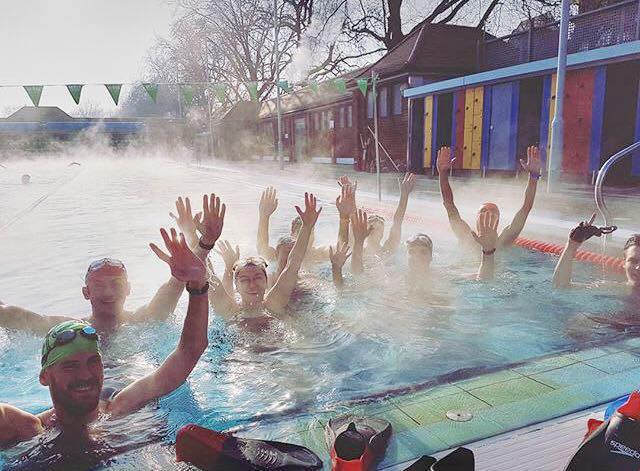Rob is a professional triathlon coach based in Hackney who has worked with LFTC on and off for a number of years. He holds a British Triathlon Level 3 coach qualification, is currently lead coach for the LFTC Juniors sessions on Saturdays and is a certified Sports Massage Therapist. Alongside discussing the finer points of triathlon training, Rob is also a martial arts veteran and coffee bean connoisseur! This post came about after a discussion with Rob about if, when and how club athletes might consider getting individualised training advice.
Maybe you are totally new to triathlon and feeling overwhelmed by it all, not sure where to start, how to fit all the training in, or how to get fully prepared for your first race.
Maybe you have been doing triathlons for a while now and you have plateaued, you are struggling to keep making improvements year on year, or you realize that you need more structure in your training, more objective feedback to take it to the next level.
Either way, you might be thinking that you need a coach, some training plans, some guidance or just more structure and support in your triathlon life. Maybe a coach is the answer for you, maybe not. No doubt about it, having a personal coach to write training plans just for you can be expensive, although there are few other options that will give you the sort of personal support that you can get from a qualified, experienced coach. Let’s consider the options available to you, look at some of the pros and cons, and you can figure out the right choice for you.
Option 1: Make the most of your club membership
Most triathlon clubs offer a wealth of shared experience, knowledge and support. A common misconception is that “you have to be good enough” to join a triathlon club or show up to certain sessions, but you should just try and look at most clubs as excellent places to train and get to know other triathletes, regardless of your current skill level. In my experience, most clubs have members who represent a full spectrum of skills and training goals, from sprint to iron distance, from total newbies to people who have represented their age group at world championships. Joining a club can be an excellent way to increase your love for the sport, raise your game, expose you to other triathletes who will push and challenge you.
A club like LFTC also happens to be extremely well organized, with a dedicated group of volunteer (and a few professional) coaches who discuss and plan sessions intelligently and cohesively. Since seeing the club start from its very earliest days, I have always been impressed with LFTC’s ability to share knowledge and deliver well-coached sessions in all triathlon disciplines.

By joining in with club sessions, you can get some of the structure and consistency that you might be looking for, whether you are a beginner or an experienced triathlete. Committing to a training session with other people is one of the most effective forms of motivation to do regular training that you might otherwise struggle to do. One downside is that you might find yourself a little confused about which of the club sessions fits in well with your planned training, and which ones should be skipped and replaced with sessions you do on your own.
Option 2: Write or follow your own training plans
For the experienced triathlete, especially one who has followed a consistent routine for at least a year or two, you may well be able to read up on the subject and create your own training plans. Online services like TrainingPeaks can be excellent for doing this, and they even offer a lot of built-in tools to facilitate the process of periodizing your own training plans with some top-notch advice trickling down from Joe Friel and other amazing coaches.
You might also find it useful to download some generic training plans from a reliable source (such as BeginnerTriathlete.com), maybe tweak them a little bit for your own needs. And, sometimes, it is possible to ask a Level 3 coach to have a look at your plans and make some suggestions for some big-picture improvements or changes that might help. That way, you might be able to avoid some of the higher costs of having a coach writing plans for you constantly, but still get the benefits of structured plans.
Option 3: Get a coach
The main benefits of having a coach are: accountability, unified advice and objective feedback. These are the sorts of things you are essentially paying for, those added dimensions you won’t get from anecdotal advice and trying to figure it all out yourself.
Accountability comes from having someone who is going to check up on you and check in with you, from time to time. Some coaches can be very accommodating and accepting, understanding that life has a way of getting in the way of your training plans that look great on paper, and they can help you adjust accordingly, as you go along. Other coaches can be quite harsh disciplinarians who may be less empathetic about missed sessions or what they might perceive to be lame excuses. You should have a think about which kind of coach you would prefer and choose one accordingly.
Unified advice is another thing you sometimes miss out on when you train on your own or train with a club. It is surprisingly easy to get conflicting advice on almost any given subject, when you read different articles or ask around your friends. Some of it is very confusing (e.g. What are the best ways to improve your swimming, as a triathlete?), with lots and lots of differing points of view, most of which are probably correct, but still hard to consider when it comes to your own personal needs. So, it can be great to have a coach who can help you navigate all your various questions, give you a consistent viewpoint on some of the complex issues, and (most importantly) refer you to a more expert person when they can’t answer your questions. It’s not so much about being right or wrong on any given subject, as it is about figuring out what works best for you.
Like I said, I am biased – I am a professional Level 3 Triathlon Coach and this is how I make much of my living, so you can read the above with that in mind. But, if you think you could benefit from this advice, and some of the other less tangible benefits (perhaps your chosen coach has specific experience in exactly the area you are training in, or perhaps they have a personality that you respond to very well), then getting a coach might be the right way for you to go.
You can find Rob at www.triathlonsportsmassage.com.
